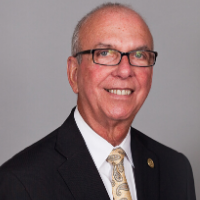NWI Forward: COVID-19 Questions with Chancellor Thomas Keon

Thomas L. Keon, Ph.D.
As the COVID-19 global health (and economic) crisis continues to wreak havoc on Northwest Indiana, business executives and community leaders alike are stepping up to help us adjust to a vastly changed landscape.
In addition to online community conversations and educational workshops, our organizations reached out to a group of Northwest Indiana leaders that represent a wide variety of industries and roles. From shifting how their entire team does business to leading county-wide emergency responses, they are showing us a way forward.
NWI Forward is a collaborative effort between the Society of Innovators and Leadership Institute at Purdue Northwest.
COVID-19 Questions with Chancellor Thomas Keon
Thomas L. Keon, Ph.D. serves as Chancellor of Purdue University Northwest. Chancellor Keon’s leadership centers on positioning Purdue Northwest as a key player in Northwest Indiana’s economic development, educational advancement, environmental sustainability and cultural enhancement.
How has this crisis been similar to events like 9/11 or the 2008 recession and how is it different?
I think that there are similarities and differences. 9/11 really closed down the country for a week or two, but things came back quickly. There is a sense in this that everything has closed down but may not be coming back as quickly as the turnaround from 9/11. The 2008 recession had long, long term negative impact, and I’m not sensing from this, at this point, that we would have such a long term negative impact.
What short-term measures did you put in place to keep your business running?
Our big activity to keep things going was to shift to online classes. The big unknown for us is what will happen in summer and fall. We have a lot of first generation students and those are oftentimes the ones that are hit the hardest in a situation like this.
What have been your COVID-19 success stories?
Probably one of the biggest success stories is our students that have been working with our 3D printers. The students have six 3D printers to work at, some of them are on each campus and they’ve been making face shields. And they delivered face shields to InHealth so that they could be used by ambulance drivers to protect them as they go through their daily routine.
What is emerging from this crisis that gives you hope?
This mass adoption of technology has allowed us to make some plans going forward, for example, that would reduce some of our printing costs. So probably only half of our faculty have ever used an online platform, but now everybody has used some form. So we’re planning on everybody having all of their syllabi online by fall so that we don’t have any paper or printing costs.
What additional advice can you share?
I would urge people, particularly in leadership roles, to try to consume as much information as possible so that we can advise employees, and in our case students, to try to get out of this as quickly as possible and to minimize the impact. We need to be thinking about how to be strong on that exiting.